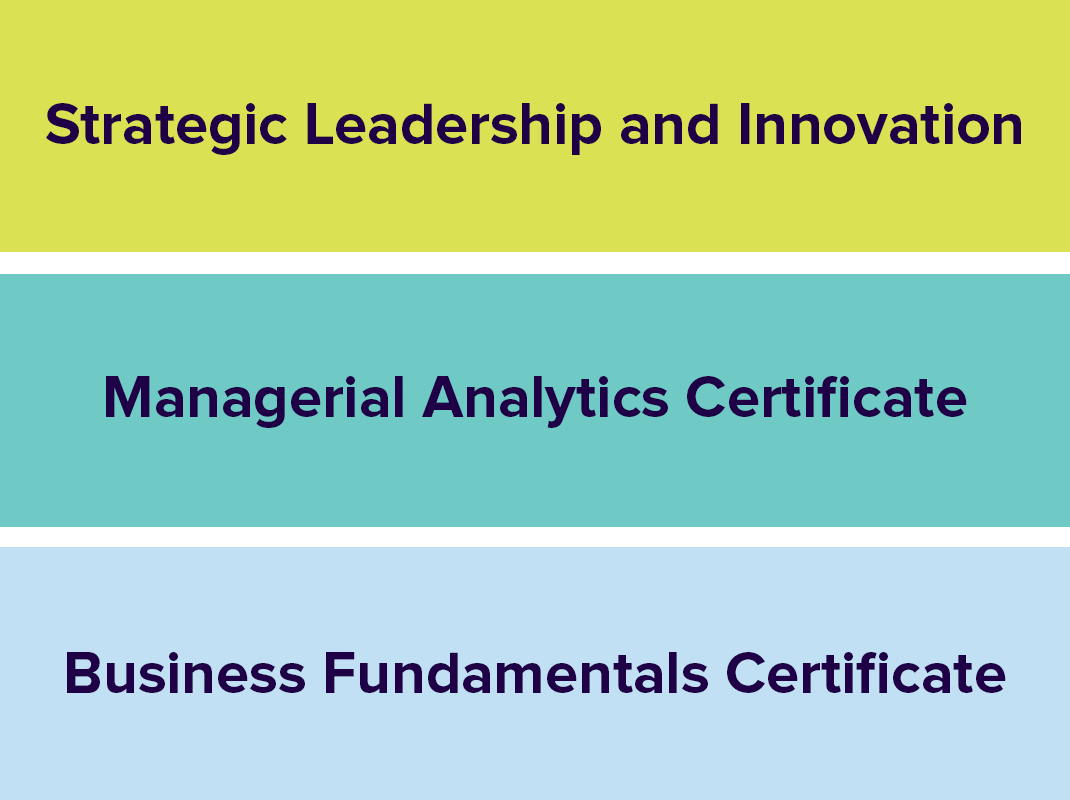Curriculum
Earn your MBA in less time than you think
Designed with you in mind, our MBA requires 30 credits of coursework covering the core business concepts - that’s just ten classes. We get you the business knowledge you need in fewer classes that can be completed in less time.
This is a curriculum designed for working business professionals like you, ready to gain a comprehensive and strategic understanding of issues facing managers in today's complex business environment.

The Online MBA
UNI is now offering a fully online MBA program. Starting in Fall 2024, some courses will be offered fully online in real-time. All MBA courses will be offered fully online in Fall 2025
Stackable Certificates
The 10 courses in the MBA curriculum are organized into three certificate programs, giving you more flexible options for graduate study.
- Business Fundamentals Certificate
- Strategic Leadership and Innovation Certificate
- Managerial Analytics Certificate
You can earn individual certificates to get just the business knowledge you need - or earn a full MBA by completing all three certificates at your own pace.

MBA Degree Required Core Classes (10 classes, 30 credits)
These classes are offered every year - see our schedule of classes for more information.
- Business Strategy
Analysis of business organization, its environment, and the strategic planning function.
- Financial Management and Markets
In-depth examination of tools, concepts, theories, and analysis of managerial finance integrated with case applications. Students expected to apply concepts from managerial finance in analyzing, presenting, and discussing cases at an advanced level.
- Accounting for Business Management
Use of accounting data in managerial decision-making process and in the analysis and control of business operations.
- Research & Analysis for Management Decisions
Study of the tools and techniques for business research and data analysis. Emphasis on applying the tools and techniques to determine, define, and solve complex business problems and improve managerial decision-making.
- Marketing Management
Integrated and applied approach that utilizes current theory and practice to analyze market data and competitive signals to make informed decisions about customer trends, competitor behaviors, marketing mix, and strategic marketing opportunities.
- Leading People, Driving Success: Leadership and HR Management
This course will use principles of organizational behavior applied to managerial practices and human resource management to show how effective leadership in managing people can drive overall success for employees and organizations.
- Innovative Thinking & Creative Problem Solving
This course explores the essential skills and mindset needed to drive innovation in the business world. Students will learn strategies to foster creativity, generate novel ideas, and solve complex business problems.
- Business Intelligence
This course provides a broad overview of business intelligence and data management techniques, including data management/data governance strategies, data mining and other business/data analytics techniques, and business intelligence approaches. The primary emphasis will be on the managerial perspective, focusing on how you can design, implement, and leverage business intelligence systems and strategies in a management role.
- Information Systems & Data Visualization
This course provides students with knowledge of the role of information systems within an organization and how information systems can be used to support decision-making through the use of data visualization. Students will learn to identify, access, and prepare data for visualization based on best practices and to create dashboards and data stories that effectively communicate data insights to aid in decision-making.
- Cross-Functional Operations
Analysis and design of business operational decisions in complex production and service environments.
